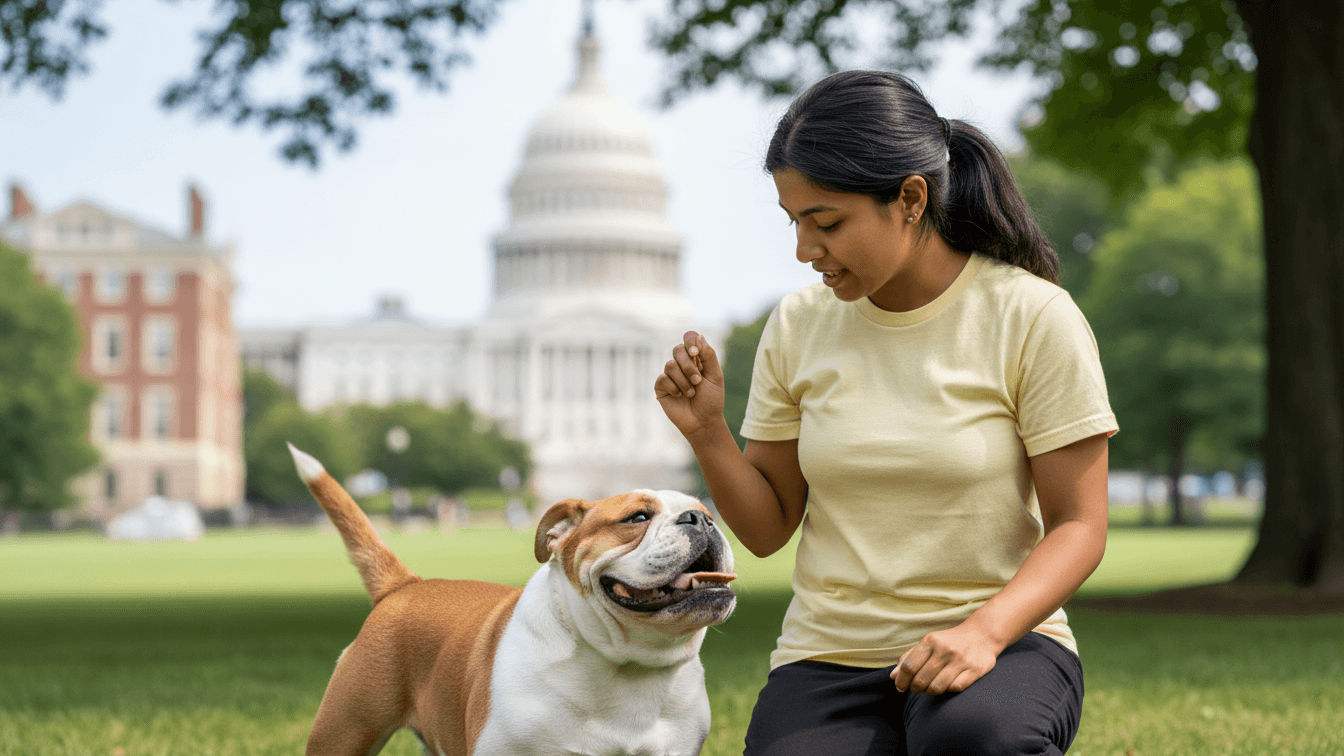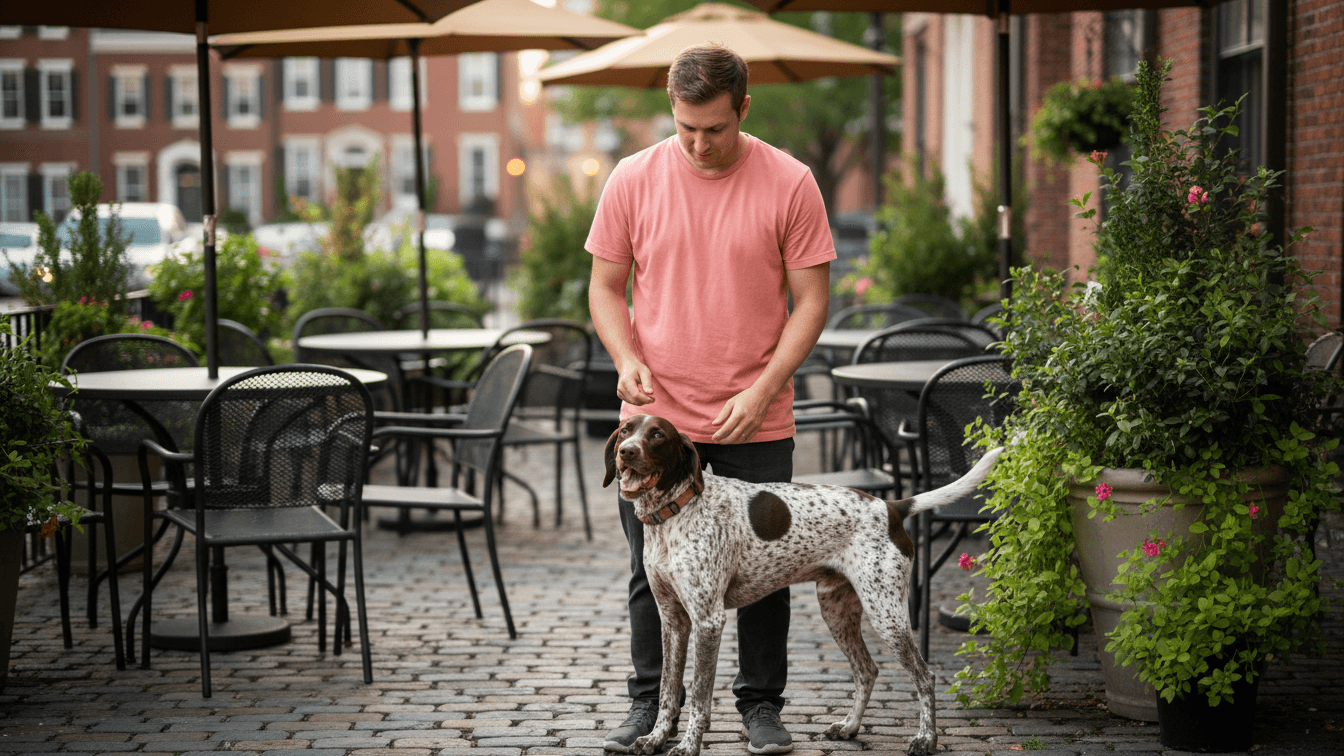Your Complete Guide to Choosing a Dog Trainer in Capitol Hill, DC and Surrounding Areas
Living with a dog in Capitol Hill means navigating historic sidewalks, crowded Metro stations, and busy row house neighborhoods. Your dog needs to walk calmly past Eastern Market vendors, wait politely outside Barracks Row cafes, and stay composed when neighbors pass on narrow sidewalks.
Capitol Hill sits in the District of Columbia, which has its own unique regulations and urban challenges. When you find a trainer who understands these local details, you’ll get better results both at home and out in your community.
How to Choose the Right Trainer
Start by looking for someone who uses positive reinforcement training and can set realistic goals for your Capitol Hill lifestyle. This means your dog should learn to walk calmly through Lincoln Park, stay focused near the Library of Congress crowds, and handle close encounters with other dogs on tight sidewalks.
Credentials give you a quick way to compare trainers’ experience levels. Common dog trainer certifications include KPA-CTP, CPDT-KA, or IAABC-CDBC for behavior problems. If your dog has serious aggression issues, look for someone with CBCC-KA or a science-based program like CTC.
In-home dog training works great for puppy training, door greetings, and neighborhood leash skills. Group classes make sense once your dog can focus around other dogs, especially before you try busy spots like Eastern Market on weekends.
Common Dog Training Methods Explained

Reward-based methods build the trust you want while creating lasting behavior changes. They also help you follow DC’s rules about keeping dogs under control in public.
Basic obedience covers sit, down, stay, place, recall, and leash training so your dog can handle walks, restaurant patios, and park visits without pulling or jumping on people. These skills are especially important when navigating Capitol Hill’s narrow brick sidewalks and crowded pedestrian areas.
Puppy classes focus on socialization, potty training, bite control, crate comfort, and early leash skills. Starting with short, positive training sessions prevents bad habits from forming in the first place.
Behavior modification addresses fear, reactivity, resource guarding, or separation anxiety through careful desensitization and counterconditioning. For serious cases, ask if your trainer works with local veterinarians.
Private lessons and in-home sessions let you customize everything around your daily routines, while day training can speed up results when you’re short on time. Board and train programs can work for intensive obedience training, but make sure the facility uses humane methods and includes owner education.
Dog training classes help your dog practice good manners around other dogs and people. The best classes give dogs plenty of space, screen participants carefully, and teach calm behavior rather than just excitement.
Specialized training like therapy dog training or service dog training requires extra structure, public-access skills, and a very clear step-by-step program. DC has specific rules about service animals in public spaces that a professional dog trainer should understand.
Stay away from trainers who use fear, intimidation, or pain to get results. Humane methods are safer for everyone, easier to maintain long-term, and much better for keeping peace with your neighbors in close-quarters row house living.
Average Cost of Dog Training in Capitol Hill, DC (Updated for 2025)
Prices around Capitol Hill and the District depend on the trainer’s experience, how long sessions last, and where the training happens. Here’s what most local pet owners are paying in 2025.
| Service Type | Average Cost (Capitol Hill/DC) |
|---|---|
| Puppy classes (4-6 weeks) | $175-$325 total |
| Group obedience classes (4-6 weeks) | $200-$350 total |
| Private lessons (60-90 min) | $130-$225 per session |
| In-home coaching packages (4-6 visits) | $500-$1,100 total |
| Day training (trainer works your dog + handoff) | $550-$1,100 per week |
| Behavior consult for reactivity/anxiety (initial) | $175-$300 |
| Board and train (2-4 weeks) | $2,500-$5,500 total |
You’ll probably pay higher rates for training in Capitol Hill compared to surrounding areas because of the high cost of doing business in DC. Make sure you understand what’s included, how the trainer tracks progress, and whether they offer a free consultation or free evaluation before you sign up.
Questions to Ask a Potential Dog Trainer
- What training methods do you use, and how do you keep training sessions positive and low-stress?
- What credentials do you have, like CPDT-KSA or KPA-CTP? Do you keep up with continuing education?
- How will you customize the training program for my dog’s specific needs and our Capitol Hill lifestyle?
- Do you offer in-home visits, dog training classes, or day training, and which approach fits my goals best?
- How will we measure my dog’s progress and know when to add more distractions?
- What are the total costs, including any travel fees, and what’s your cancellation policy?
- Do you carry liability insurance, and can you show me proof?
- For behavior problems, will you work with my veterinarian if needed?
- What should I practice between our sessions to help your dog keep improving?
Local Capitol Hill Rules and Considerations
The District enforces leash laws and nuisance rules to keep parks and neighborhoods safe for everyone. Understanding these regulations will help your dog become a well-behaved companion in this dense urban environment.
Leashes are required in all public spaces except inside designated dog parks. DC law requires a leash no longer than 4 feet in public areas, which is shorter than many other jurisdictions. Keep this shorter leash with you for sidewalks, parks, and around the Capitol grounds.
DC requires all dogs over four months old to be licensed through the DC Department of Health. You’ll need proof of current rabies vaccination to get the license, and the tag must be worn on your dog’s collar. You can find more details on the DC Dog License page.
Excessive barking can be considered a nuisance, so work with your trainer on alert barking and separation anxiety before neighbors start complaining. In row house communities, sound travels easily between units.
The District doesn’t require special licenses for expert dog trainers, but any business operating in DC needs a basic business license. If a trainer offers boarding as part of dog training services, they may need additional permits.
DC law prohibits cruel treatment of animals and specifically bans certain training tools. Professional trainers operating in the District follow these animal welfare regulations closely.
Local Capitol Hill Resources for Dog Owners
These spots give you great places to practice polite manners, work on recalls, and provide safe enrichment for training for dogs. Always follow the posted rules and etiquette guidelines.
- Marion Park Dog Park on 6th and E Street SE offers a fenced area where you can practice off-leash recall and socialization. The park can get crowded during peak hours, so early mornings work best for focused training.
- Garfield Park at 3rd and F Street SE provides open green space for leashed practice, though it’s not a dedicated dog park. This location is perfect for working on loose-leash walking and basic commands.
- RFK Stadium Dog Park near the stadium parking lots gives you one of the larger fenced spaces in the area, with separate sections for small and large dogs.
- Lincoln Park offers tree-lined paths for leashed training walks, helping your dog learn to stay calm around squirrels, other dogs, and families.
- The Anacostia Riverwalk Trail system welcomes leashed dogs and provides excellent opportunities to build focus around joggers, cyclists, and wildlife.

FAQs
How much does in-home dog training cost?
Most Capitol Hill trainers charge $130-$225 per in-home visit, with discounts available when you buy packages. Behavior problems typically start at the higher end of that range.
Is in-home dog training worth it?
Absolutely, because you’re working on problems exactly where they happen. Your trainer can fix door manners, jumping on guests, counter-surfing, and stair reactivity right at home, then step outside to practice leash skills on your actual neighborhood sidewalks.
Can you pay someone to house train your dog?
Yes, many trainers offer puppy programs that include potty training, crate routines, and daily schedules. Day training can speed up the process while teaching you how to maintain the progress, which is especially helpful for busy professionals living in Capitol Hill.
What is the 3-3-3 rule for dog training?
This is a helpful timeline for new or adopted dogs: expect about 3 days for your dog to decompress, 3 weeks to learn your routines, and 3 months to feel completely settled. Good training plans work with this natural adjustment period rather than against it.
How long will it take to reach my training goals?
Most puppies and friendly adult dogs show solid progress within 4-8 weeks if you practice daily. Fear, reactivity toward other dogs, or aggression typically requires several months of careful behavior modification with gradual increases in difficulty.
What should I bring to group classes?
Pack a flat collar or harness, a 4-foot leash (to comply with DC regulations), high-value treats, water, and current vaccination records if your trainer requests them. Leave retractable leashes at home for safety reasons.
What’s the leash law in Capitol Hill?
DC law requires dogs to be on a leash no longer than 4 feet in all public areas, except inside designated off-leash dog parks. This shorter leash requirement is stricter than many other jurisdictions, so make sure you have the right equipment.
Do I need a dog license in Capitol Hill or DC?
Yes, all dogs over four months old must be licensed through the DC Department of Health. You’ll need proof of current rabies vaccination to obtain the license, and the tag must be visible on your dog’s collar at all times.
What shots does my dog need in DC?
Rabies vaccination is required by DC law for all dogs over four months old. Your veterinarian may also recommend distemper-parvo, bordetella, and leptospirosis based on your dog’s lifestyle and exposure to other dogs at parks and training classes.
Are dog trainers required to be licensed in Capitol Hill or DC?
The District doesn’t require special certification for dog trainers, but all businesses operating in DC need a basic business license. Look for trainers with national certifications and proof of liability insurance rather than relying on business licensing alone.
Where can I practice off-leash recall?
Use fenced dog parks like Marion Park Dog Park, Garfield Park Dog Park, or RFK Stadium Dog Park to keep things safe and legal. Try visiting during quieter hours when you’re starting out.
Which dog parks allow training around Capitol Hill?
Marion Park Dog Park, Garfield Park Dog Park, and RFK Stadium Dog Park all allow off-leash play within their fenced areas. These spaces work well for practicing recall, socialization, and basic commands in a controlled environment.
What trails allow dogs for training?
The Anacostia Riverwalk Trail system welcomes leashed dogs and provides miles of paved paths perfect for teaching calm focus around cyclists, joggers, and other dogs. Rock Creek Park, accessible from nearby neighborhoods, also offers extensive trail systems where leashed dogs can practice obedience training.
How do I help my dog adjust to Metro stations and public transportation?
Start by practicing calm behavior near busy intersections and gradually work up to Metro station entrances. Your trainer can help you develop a systematic plan to desensitize your dog to the sounds, crowds, and escalators before attempting a full Metro ride.
What do I do if my dog is reactive on narrow Capitol Hill sidewalks?
Work with a certified dog trainer who specializes in reactivity and understands urban environments. You’ll need to teach your dog to focus on you, use strategic positioning, and practice emergency U-turns before the threshold distance is breached.
The right combination of thoughtful planning, humane methods, and consistent practice around Capitol Hill’s parks and neighborhoods will help your dog become a confident, well-behaved companion. Finding the best dog training fit for your lifestyle means considering both the trainer’s credentials and their understanding of urban challenges unique to living in this historic DC neighborhood.
